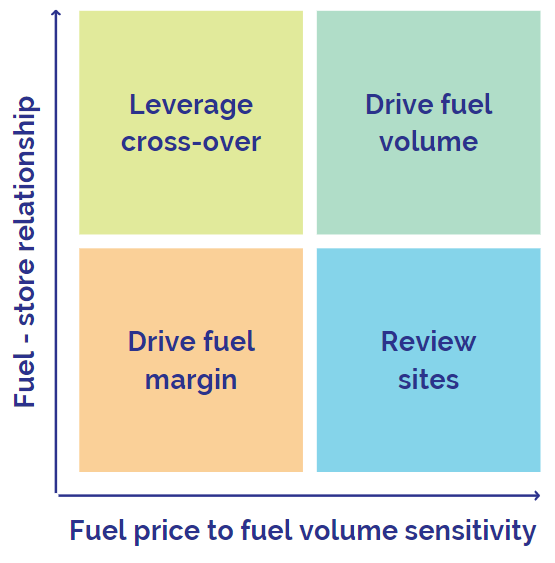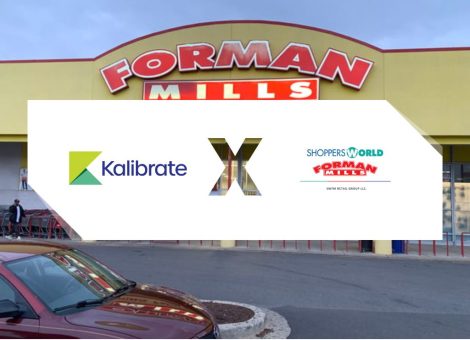How will understanding the relationship between fuel and store benefit my organization?
There is, undoubtedly, a link between the performance of your convenience store and the volume of fuel that you sell at your gas pumps. But understanding that link is not always straight forward.
Kalibrate ‘s new eBook “The link between fuel sales and in-store sales — and how it can be used to increase profitability” discusses a data led approach to analyzing the relationship between gas and convenience sales — that could boost your overall profitability.
You can download the eBook here, or read on to find out more about the approach.
It’s not enough to understand the relationship on its own. But when combined with additional data that defines each site’s sensitivity — it can drive impactful strategy changes.
Let’s take a look at the diagram below:’
After a thorough analysis, each of your sites can be plotted on the graph.
The X axis plots sites based on their sensitivity. How sensitive are your customers to price changes? How much do price changes impact fuel volumes?
The Y axis plots sites based on the strength of the relationship between fuel and store sales. As fuel volume increases or decreases, does store volume change accordingly?
Plotting individual sites onto this graph will give you four quadrants that can then be used to define combined strategies.

1. Drive fuel volume (opportunity sites)
These are your opportunity sites. Sites that have high fuel store link values and high fuel price sensitivity — where a slight lowering of fuel price would attract more customers and result in an increase in convenience store traffic.
2. Drive fuel margin (fuel driven sites)
These sites have low price sensitivity and low fuel store link values. For these fuel-driven sites, you can implement a slight increase in fuel price without impacting fuel sales or in-store traffic, thus increasing your overall profitability by increasing the margin made on fuel sales.
3. Leverage cross over (store focused sites)
These sites have a strong relationship between fuel and in-store sales and low fuel price sensitivity. An increase in fuel price can be carefully tested to ensure that convenience store cross-over is not affected.
4. Review sites
These sites have a weak relationship between store sales and fuel sales and a high price sensitivity. Although these sites are not likely to see immediate benefits in-store from increased fuel volumes, they can be utilized to drive fuel volume when the company has increased volume needs. And non-pricing strategies can be implemented to move fuel customers into the store, like linked rewards or advertising on the forecourt. If this proves successful, then it would be warranted to drive fuel (and in-store customers) more consistently by slightly lowering fuel price.
So by looking at your sites individually, you can assess the opportunity that each one presents and determine a site strategy that drives overall profitability.
Download the eBook to understand more about how to analyze the link, who can benefit from this approach, and how it’s helped other fuel retailers.
Read more articles about:
Fuel pricingSubscribe and get the latest updates
You may unsubscribe from our mailing list at any time. To understand how and why we process your data, please see our Privacy & Cookies Policy
Related posts
Fuel pricing
November 2025. Kalibrate's Canadian Petroleum Price Snapshot
Kalibrate conducts a daily survey of retail gasoline, diesel, propane, and furnace fuel prices in 77 Canadian cities....

Location intelligence
Forman Mills accelerates growth with the Kalibrate Location Intelligence platform
The value apparel and home goods retailer selects Kalibrate to to support its national expansion strategy.

